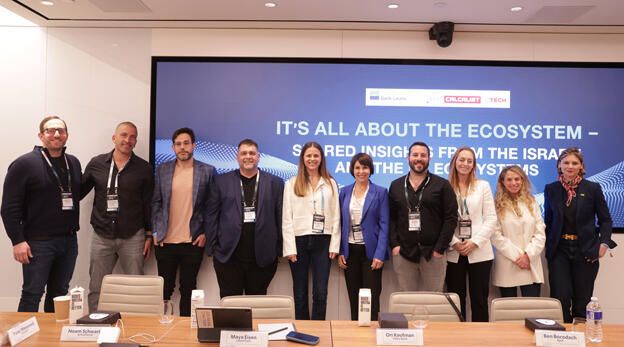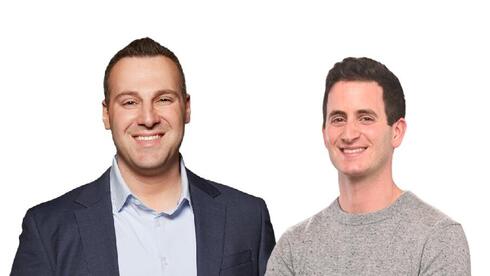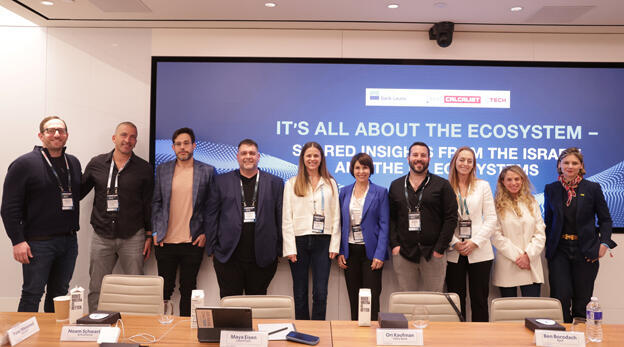
Mind the Tech NY
"In Israel, as in New York, entrepreneurs need a strong ecosystem"
Anat Katz, Israel's economic attaché in New York, was speaking as part of LeumiTech's roundtable at the Mind the Tech NY conference.
"In my opinion, Israeli startups must be in New York from day one," said Noy Levinson, Head of Startup and Venture Capital, East Coast, at Amazon Web Services (AWS), speaking at a roundtable held as part of the Calcalist and Bank Leumi Mind the Tech New York conference.
The unique event, led by LeumiTech, aimed to strengthen ties between the Israeli and New York ecosystems and highlight the importance of connecting entrepreneurs, investors, academia, corporations, and other key players as a crucial factor in the success of startups and technology companies.
Maya Eisen Zafrir, CEO of LeumiTech, opened the event: "We strongly believe in the power of the ecosystem. Especially in the past two years, when we have faced complex difficulties and challenges in Israel, we have come to realize how important and impactful a strong, collaborative ecosystem is. However, we also have a lot to learn from the world, from other ecosystems like the one in New York."
According to Levinson, "Think about the number of immigrants in New York. When you look at the data, immigrants in the U.S. founded 55% of unicorns and 65% of the leading AI companies. When you immigrate, rebuild everything from scratch, and apply that mindset to your company—it’s incredibly powerful."
Yossi Melamed, chairman of the Mamram Alumni Association, emphasized the uniqueness of the Israeli ecosystem: "What Mamaram does as an elite technological unit in Israel is unlike anything else in the world. After just six months of service, you emerge as a team leader and entrepreneur—you jump into the deep end and start your own venture. This is very different from other ecosystems that struggle to replicate that model."
Melamed added, "What we’re trying to do is build a strong bridge between the ecosystems in New York, San Francisco, and Israel because we have more than 120 Mamram alumni in New York. This is crucial because 99% of Israeli startups expand here."
John Lehr, co-founder of the New York venture capital fund Work-Bench, spoke about the value of having a physical presence in the U.S. market: "Our mission at Work-Bench is to invest in the best startups and connect them with corporations. Through various meetings and events, we enable entrepreneurs to meet potential clients and investors. We have more than 10,000 members in our New York community."
Ori Kaufman Gafter, Head of International & Tech Banking at Valley Bank, who manages teams working with Israeli and American tech companies, explained: "I moved here ten years ago and was deeply involved in tech in Israel. In recent years, I’ve come to know the U.S. tech scene inside out. What we are trying to do is bridge the gap between the two ecosystems. We aim to open doors for Israeli entrepreneurs and help them navigate this vast market—that’s where our passion lies."
Noam Schwartz, CEO of ActiveFence, spoke about the differences between the Israeli and New York ecosystems: "There isn’t just one ecosystem in New York—there are several." According to Schwartz, what makes the Israeli ecosystem unique is that it "maximizes every resource it has. Everyone helps each other get here. Personally, I believe there’s no better place to start a company than Israel, and there’s no point in moving to New York too early unless there’s a strong strategic reason."
Ben Bordach, CEO and co-founder of April, shared his experience: "When I look at the talent pool in Tel Aviv and the ecosystem in New York, I think about how we can connect the talent there with opportunities here. The level of talent in Israel is extraordinary, and when combined with the market approach that exists in New York, the results can be remarkable."
Nimrod Cohen, managing partner at TAU Ventures, highlighted the role of academia in the ecosystem: "Academia is one of the key pillars where venture capital funds should be present. The industry doesn’t do academia a favor—it benefits from it. Companies must stay informed about academic research and innovation."
Dina Pasca-Raz, partner and head of technology at KPMG Israel, added: "We, along with other major firms and financial institutions that fund startups, invest from very early stages. This is critical to ensuring startups build a solid financial foundation from the start, allowing them to scale effectively and enter international markets, particularly in the U.S., in a way that supports rapid growth."
Anat Katz, Israel's economic attaché in New York, who previously served in Singapore and Washington, shared insights from working with entrepreneurs in various markets: "True innovation has always emerged from places where entrepreneurs have faced chaos or hardship. This may explain the remarkable success of Israeli entrepreneurs. In New York, specifically, Israeli entrepreneurs benefit from the strong Jewish community, a support system that doesn’t exist in many other ecosystems."
"In Israel, as in New York, entrepreneurs need a strong ecosystem," Katz continued. "There are many nuances to how an ecosystem functions, with different perspectives from each stakeholder. I believe part of the ecosystem’s role is to help entrepreneurs find the optimal path to growth, and we have a great responsibility to be part of that."
Eisen Zafrir concluded: "Our goal is to foster and strengthen these connections, ensuring that Israeli startups have the support they need to succeed both at home and in global markets."















